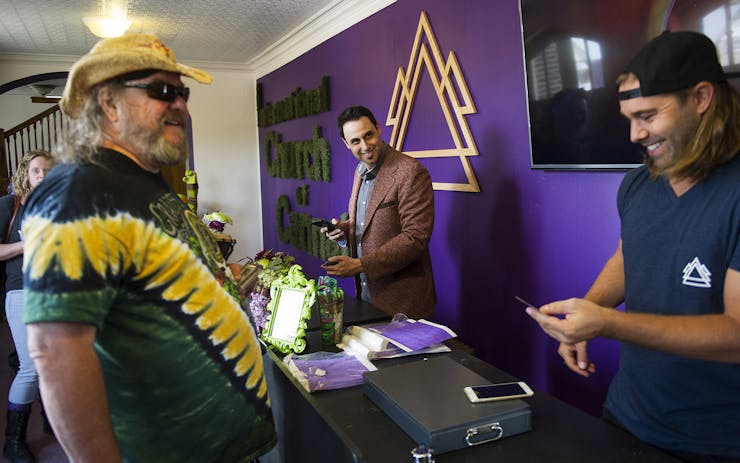A highly anticipated trial over public consumption charges at Denver’s International Church of Cannabis got underway on Wednesday morning, but the court proceedings ended about four hours after they began. The judge in the case, looking over a depleted jury pool, ruled that there were not enough prospective jurors to proceed, and declared a mistrial.
The trial has been re-scheduled for mid-July.
Prospective jurors questioned the decision to bring charges, even before the judge declared a mistrial.
The early dismissal disappointed some courtroom observers, who were anticipating one of the first high-profile cases to be prosecuted under Denver’s post-legalization public consumption law.
Three founding members of the International Church of Cannabis stand accused by Denver city officials of violating Colorado’s Clean Indoor Air Act. They have also been cited for complicity in the public consumption of cannabis during what was billed as a private 4/20 service at the church. The 4/20 service also served as the high point of the Church’s official opening day.
A Private Event on 4/20
The charges were filed after several undercover police officers entered the church and attended the April 20th event on the unofficial marijuana holiday. The church first had visiting hours for the public, and then held the private invitation-only service at 4:20 p.m.
Prosecutors claim that the defendants were complicit in fostering the public use of cannabis in an enclosed space. They have not been charged with public use.
But those defendants counter that they met with Denver city attorneys several days before the 4/20 event last year, specifically to ask how they could hold their 4/20 ceremony and remain in compliance with city laws. They also claim that the event was private and not open to the public. Therefore, they say, it should not violate the city’s public consumption laws.
Not Enough Jurors
Soon after preliminary interviews of jurors by the prosecution and defense, the judge announced that the jury pool of 24, which was whittled down to 15, was not large enough to seat the six necessary jurors. Therefore, the trial would not be able to proceed.
'I pay taxes and wonder how my tax dollars are being utilized,' one juror told the judge.
“Each side had six preemptory challenges,” defense attorney Warren Edson after the judge’s decision. “So if you take 12 away from 15, we didn’t have six.”
Before both sides agreed to the mistrial, the judge questioned several jurors. That’s when things got interesting. Several jurors questioned whether such a case was necessary in a state that legalized recreational, adult-use cannabis more than four years earlier.
Shop highly rated dispensaries near you
Showing you dispensaries near“I pay taxes and wonder how my tax dollars are being utilized,” one juror told the judge.
“I’m struggling with the amount of resources put towards this,” said another, who also noted that Denver Police at the city’s Red Rocks Amphitheater often “look the other way” when encountering cannabis-smokers at the famous open-air concert venue.
Defense attorney Warren Edson was pleased with the pushback. “It was nice to see the citizens of Denver bring up the point—not me, they did—that geez, the city seems to be spending a lot of time and money on this case,” he said.
There do seem to be a lot of resources spent on a relatively minor infraction, if an infraction did indeed occur. The charges listed each carry a maximum penalty of $300. The case has already gone through at least five pretrial hearings.
The risk for the defendants could be substantially greater, though. While the public consumption charge is only a public nuisance crime, Edson said the city can conceivably file forfeiture paperwork against the International Church of Cannabis if the defendants are found guilty. “And that is where this is headed,” he said.
This Is ‘Religious Persecution,’ Says Defendant
Denver City Attorney’s Office did not respond to requests for comment on the mistrial or the International Church of Cannabis case.
Church co-founder Steve Berke, one of the defendants at the trial, said the city doesn’t believe “that our principles are deeply-held religious beliefs. This comes down, in my opinion, to religious persecution.”
As prosecutors and the defense team prepares for the rescheduled trial in July, the City of Denver continues to move forward with licenses for public cannabis consumption spaces. Earlier this week a Denver coffee shop received approval for what may be the city’s first business license to allow customers to enjoy on-site cannabis use.





